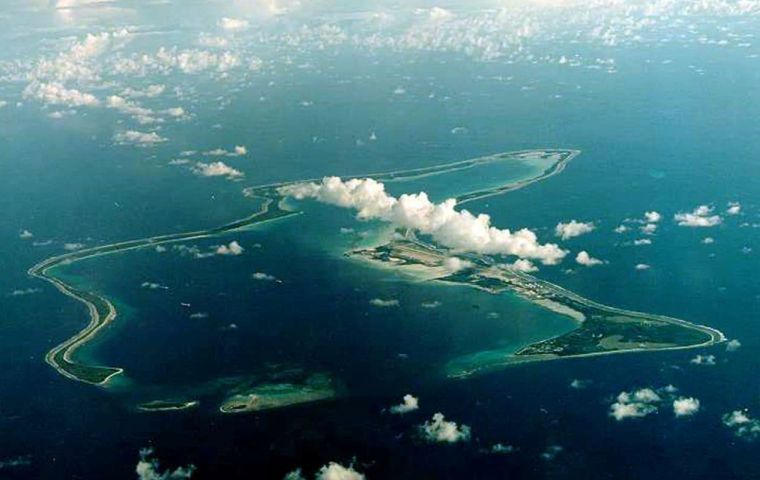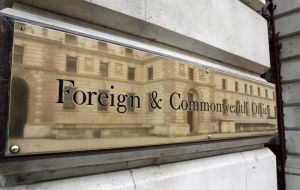MercoPress. South Atlantic News Agency
UK should end control of Chagos Islands “as rapidly as possible” says International Court of Justice
 Judge Abdulqawi Ahmed Yusuf described UK's administration of Chagos Islands, as “an unlawful act of continuing character”.
Judge Abdulqawi Ahmed Yusuf described UK's administration of Chagos Islands, as “an unlawful act of continuing character”.  The Foreign Office said: “This is an advisory opinion, not a judgment.” It added it would look “carefully” at the detail of the opinion, which is not legally binding.
The Foreign Office said: “This is an advisory opinion, not a judgment.” It added it would look “carefully” at the detail of the opinion, which is not legally binding. UK should end its control of the Chagos Islands in the Indian Ocean “as rapidly as possible”, the UN's highest court has said. Mauritius claims it was forced to give up the islands - now a British overseas territory - in 1965 in exchange for independence, which it gained in 1968.
The International Court of Justice said the islands were not lawfully separated from the former colony of Mauritius.
The UK Foreign Office said: “This is an advisory opinion, not a judgment.” It added it would look “carefully” at the detail of the opinion, which is not legally binding.
The UK has previously said it will hand the islands back to Mauritius when they are no longer required for defense purposes.
Referencing that, the Foreign Office said: “The defense facilities on the British Indian Ocean Territory help to protect people here in Britain and around the world from terrorist threats, organized crime and piracy.”
Judge Abdulqawi Ahmed Yusuf described the UK's administration of the Chagos Islands - located more than 2,000 miles off the east coast of Africa - as “an unlawful act of continuing character”.
He added the UK was “under an obligation to bring an end to its administration of the Chagos Archipelago as rapidly as possible”.
The UN General Assembly asked the court in February 2017 to offer its opinion in on whether the process had been concluded lawfully.
It is half a century since the UK took control of the Chagos Islands from its then colony, Mauritius. The British government evicted the entire population, before inviting the US to build a military base on Diego Garcia, one of the larger atolls.
Mauritius was in the middle of negotiating its independence from the UK at the time and has repeatedly condemned the deal.
Some of those who were forced to leave their homes on the Chagos Islands in the late 1960s hoped they would be allowed to return - and not just on one of the rare visits authorized by the UK.
Speaking to the BBC last year, Samynaden Rosemond, who left when he was 36, said: “Back home was paradise.” He and his wife, Daryela, moved to the outskirts of the capital of Mauritius, Port Louis.
Chagossians often complain that they are treated as second-class citizens in Mauritius, and they often gather to cook coconut and fish curry and to sing songs about the life they left behind.
Mr Rosemond added: “The British didn't give us a chance. They just said: 'Oh, this is not yours anymore.' If I die here my spirit will be everywhere - it wouldn't be happy. But if I die there I will be in peace.”
Several Chagossians gathered at the Chagos Refugee Group's centre to follow live the session of the International Court of Justice in The Hague.
It was in an explosion of joy that the news was celebrated by both them and their descendants in Pointe aux Sables - a suburb of the Mauritian capital, Port Louis.
The leader of the Chagos Refugees Group, Olivier Bancoult, said it was a historic day. “I dedicate this victory to the entire Chagossian community that is scattered in several countries around the world,” he said.
“It is a great victory as all the time we wanted to go gather on the graves of our families that we lost there [on the Chagos Archipelago]”.
Mauritian Prime Minister Pravind Jugnauth said the UK had always emphasized respect for international laws and, as such, expected the country, with which Mauritius has excellent relations, to respect the judges' opinion.




Top Comments
Disclaimer & comment rules-

-

-

Read all commentsThe scale of emphasis laid upon the importance of self-determination in the decolonization process, both in the Opinion, and the accompanying Declarations and Separate Opinions was surprising. The right of self-determination, which the ICJ affirmed was applicable to all the NSGTs (no exceptions) now appears to reign supreme. There can be no action regarding a NSGT without the consent of the people.
Feb 26th, 2019 - 11:55 pm +2Needless to say, Argentine lawyers are currently attempting to reinterpret odd sentences in their favour. Such is the way of lawyers (and other parasites).
Perhaps the biggest thing that has not yet attracted much attention was an apparent redefinition of operative para.6 of Res 1514 confining it to NSGTs and being non-retrospective. Oh, and the Opinion mentioned that populations of NSGTs had the right of self-determination; not just 'peoples.'
Will it make much difference? Probably not, but it'll keep the lawyers occupied for months attempting to pick it apart.
Also stated in para 161 of ICJ Opinion – ‘’the subsequent development of international law in regard to non-self-governing territories, as enshrined in the UN Charter made the principle of self-determination applicable to all of them’’
Feb 26th, 2019 - 01:42 pm +1“as rapidly as possible”
Feb 28th, 2019 - 03:04 pm 0As in around year 2054? it can't be done any faster, cause: the rental contract. One can't just evict the tennants without proper notice.
Commenting for this story is now closed.
If you have a Facebook account, become a fan and comment on our Facebook Page!